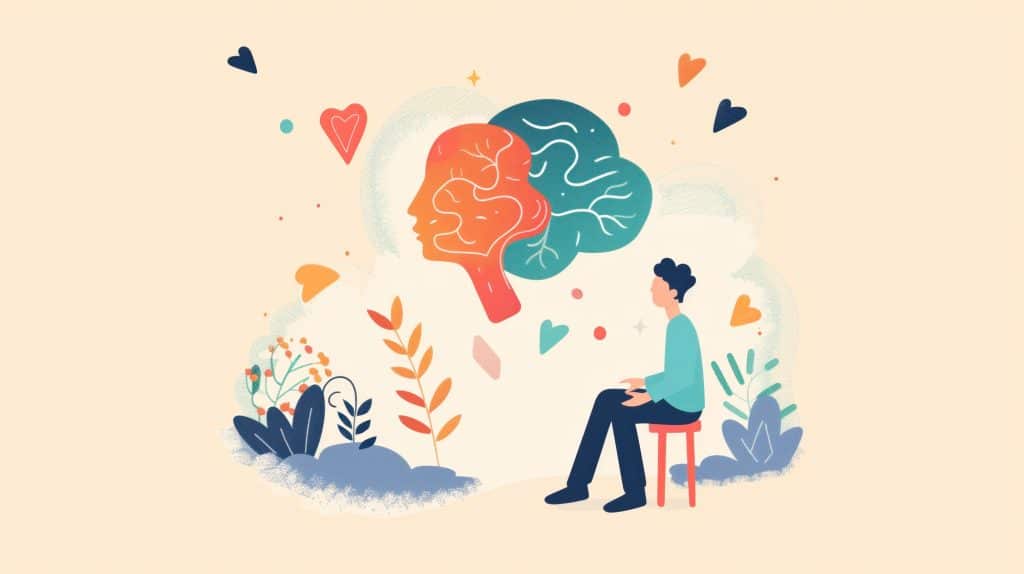Creating Space for Ideas Boosts Mental Health
Ella Knight August 1, 2025
In today’s fast-paced world, our minds are constantly bombarded with information, demands, and distractions. The pressure to be productive and constantly engaged can leave little room for creativity or mental well-being. However, creating space for ideas has emerged as a powerful practice to boost mental health, creativity, and productivity. The simple act of clearing mental clutter can lead to profound benefits in both professional and personal life.
This article explores the importance of creating mental space and how it can enhance your mental health. From cognitive overload to creative breakthroughs, we’ll dive into the science behind mental clarity and provide practical strategies for fostering space in your mind.

The Science Behind Mental Space and Mental Health
Mental Clutter and Its Impact on Mental Health
Mental clutter refers to the overwhelming, disorganized thoughts that fill our minds, often caused by stress, information overload, and daily distractions. This clutter can affect cognitive function, emotional regulation, and decision-making. According to a study by the American Psychological Association (2022), mental clutter is directly linked to feelings of anxiety, stress, and burnout.
When the mind is cluttered, it becomes harder to focus, be creative, or engage in thoughtful problem-solving. The constant flow of thoughts can lead to a diminished ability to prioritize tasks, which creates a cycle of stress and overwhelm. Mental space, on the other hand, helps alleviate this strain by providing a mental reset, allowing individuals to approach their tasks with a clearer mind and more energy.
How Creating Space Enhances Cognitive Function
Research from Harvard University (2023) suggests that clearing mental clutter improves cognitive function, particularly attention, creativity, and memory. A study published in Psychological Science (2023) found that people who regularly engage in activities designed to clear mental clutter, such as meditation or reflective thinking, show improved concentration and cognitive performance. By allowing the mind to rest and reset, we create a fertile environment for fresh ideas to grow.
Moreover, cognitive flexibility, the ability to adapt to new situations and think outside the box, is enhanced when we make space in our minds. When we are not overwhelmed by unnecessary thoughts, we are more capable of recognizing patterns and making connections, which is essential for problem-solving and creativity.
How Mental Space Boosts Creativity and Innovation
1. A Rested Mind Fuels Creativity
Many creative breakthroughs occur during moments of relaxation or mental downtime. Daydreaming or engaging in non-task-oriented activities like walking or taking a shower often sparks new ideas. According to a study by the University of California, Berkeley (2024), the mind’s most creative moments occur when it is not focused on an immediate task. By creating space for these moments of freedom, individuals allow their subconscious to make connections and come up with innovative ideas.
This phenomenon is closely related to the incubation effect, a process where our minds unconsciously work on problems when we step away from focused effort. Instead of forcing creativity, allowing mental space enables new ideas to emerge naturally.
2. Reducing Cognitive Load to Increase Innovation
When we’re constantly juggling tasks and information, our cognitive load increases. This results in mental fatigue, which limits creativity. Reducing cognitive load—the amount of information we need to actively process—allows the brain to process information more efficiently. The brain has more resources to focus on creative thinking, and as a result, innovation flourishes.
Multitasking is a common contributor to cognitive overload. Studies have shown that multitasking actually reduces cognitive efficiency and creativity. When we reduce the amount of information we are processing at any given time, our mental clarity increases, leading to more effective problem-solving and more creative solutions.
The Psychological Benefits of Creating Mental Space
1. Reducing Stress and Anxiety
One of the key psychological benefits of creating space for ideas is stress reduction. Mental clutter is often a source of chronic stress, as we try to juggle multiple responsibilities and demands without taking a break. Giving the mind space to rest and reset helps to reduce the body’s production of stress hormones like cortisol, which can lead to improved emotional regulation.
According to The Mayo Clinic (2023), practicing mindfulness or engaging in activities that promote relaxation, such as yoga or journaling, can help reduce stress and improve mental health. Taking time to clear mental clutter can provide a much-needed respite from the daily pressures of life.
2. Improved Focus and Decision-Making
When the mind is clear and calm, individuals experience better focus and decision-making abilities. Psychological Science (2022) reports that decision fatigue—an inability to make decisions after making too many—can be mitigated by reducing mental clutter. By creating space for ideas, people can make decisions with more clarity and confidence.
Practical Strategies for Creating Space for Ideas
1. Practice Mindfulness and Meditation
One of the most effective ways to create mental space is through mindfulness meditation. This practice encourages you to focus on the present moment, observe your thoughts without judgment, and create a sense of mental clarity. Studies show that mindfulness meditation reduces stress, enhances cognitive function, and fosters creativity.
If you’re new to mindfulness, consider starting with short, guided sessions. Apps like Headspace and Calm provide structured sessions for beginners. Over time, you can increase the duration of your practice as you become more comfortable.
2. Engage in Solo Activities That Clear the Mind
Time alone can be incredibly restorative. Engaging in solo activities, such as walking, journaling, or reading, can help clear mental clutter and promote creative thinking. The key is to disconnect from technology and external distractions to allow your mind to reset.
Research from The University of Oxford (2024) indicates that individuals who spend time engaging in solitary activities report feeling more relaxed and creative afterward. These activities give the brain the space it needs to unwind and recharge, fostering mental well-being and creative breakthroughs.
3. Implement Digital Detoxes
In our hyper-connected world, it can be difficult to create space in our minds when we are constantly surrounded by notifications, emails, and social media. Implementing regular digital detoxes—periods where you disconnect from all digital devices—can significantly reduce mental clutter.
Consider taking a few hours each day to turn off your phone or designate one day a week as a “tech-free” day. By cutting off constant digital stimulation, you give your mind the opportunity to focus on deeper, more meaningful thoughts and ideas.
4. Set Aside Time for Reflection
Another powerful way to clear mental clutter is by dedicating time to self-reflection. Reflecting on your day, your thoughts, and your goals can help organize your mind and reduce stress. By reflecting on what’s important to you, you can prioritize your tasks and clear out unnecessary distractions.
Try setting aside 15-30 minutes at the end of each day to jot down your thoughts, goals, or challenges in a journal. This practice helps process emotions, organize thoughts, and bring clarity to your goals.
Final Thoughts
In conclusion, creating space for ideas isn’t just about fostering creativity—it’s also about improving mental health. By clearing mental clutter, reducing stress, and taking time to reflect, we can enhance our cognitive function, emotional well-being, and overall quality of life.
In a world that values constant productivity and engagement, creating intentional space for our minds to breathe is more important than ever. Whether through mindfulness, solo activities, or digital detoxes, making space for ideas allows us to not only improve our mental health but also unlock new ideas and pathways to success.
Reference
- Mental Clutter and Its Impact on Mental Health, https://www.verywellmind.com
- Creating Mental Space for Enhanced Well-being, https://www.asid.org
- Digital Detox and Its Benefits, https://pmc.ncbi.nlm.nih.gov







